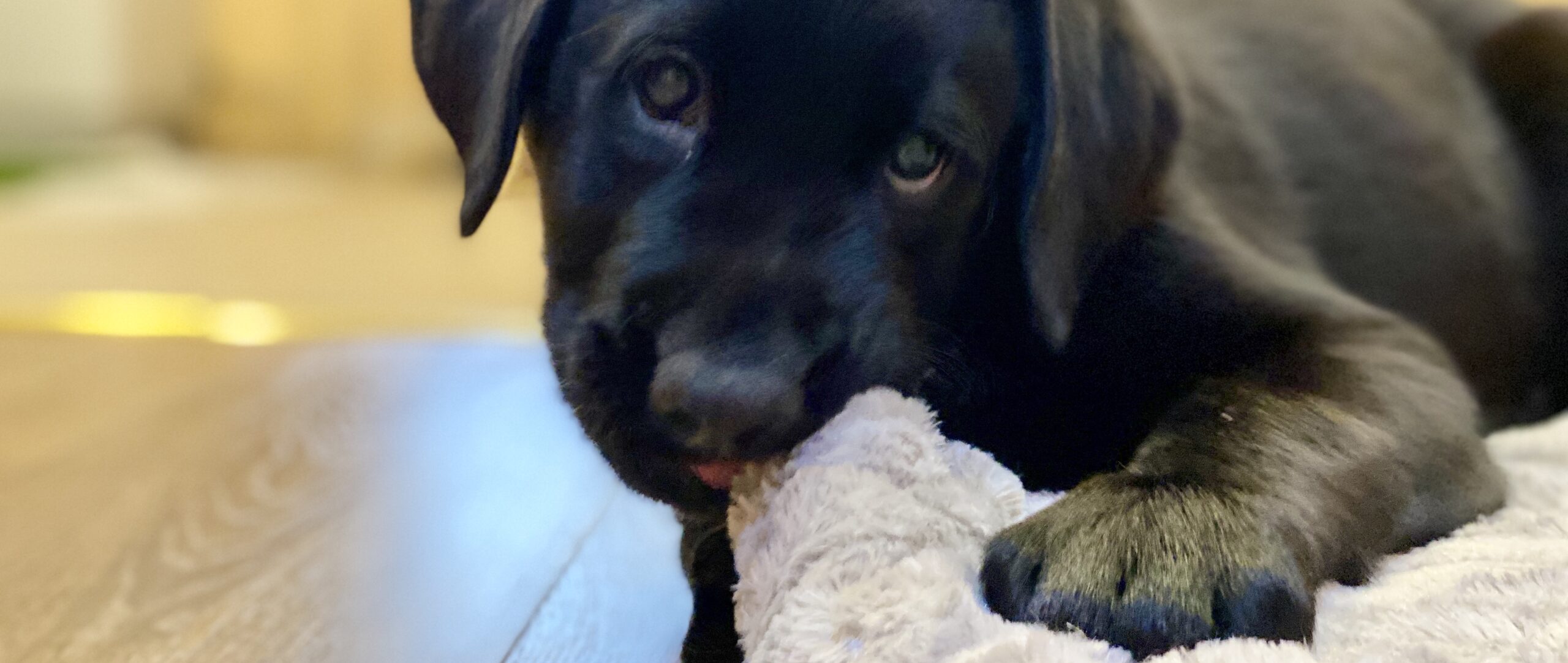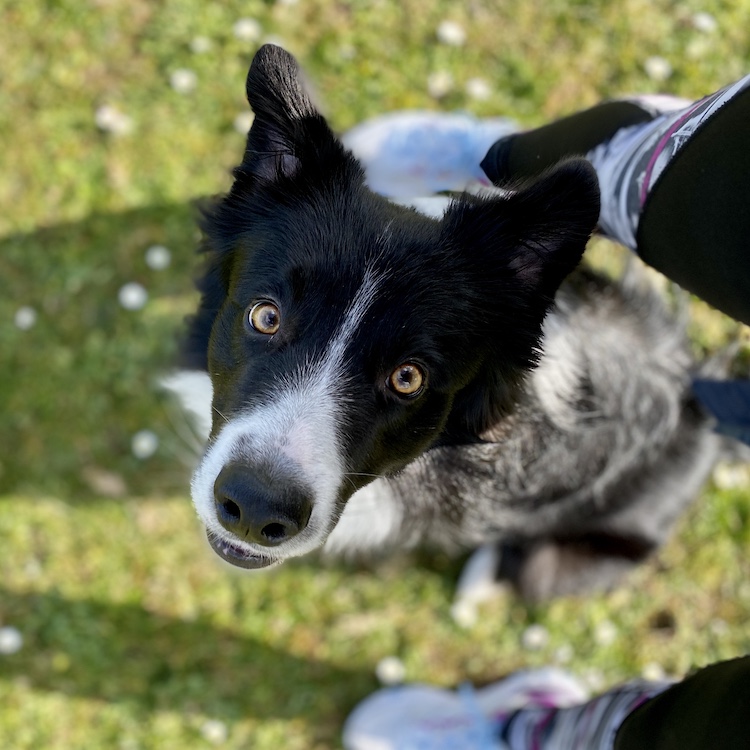
Puppy training is taking place even before we bring our puppy home. There is no such thing as a blank slate when it comes to puppies. Their genetics and early environment have already played a part in the puppy we collect from the breeder.
However, they have had less experience than when they are adults. So although they aren’t a blank slate, they can be influenced and shaped much easier during puppyhood than when they are older, due to not having time to develop such strong neurological pathways. This makes training a puppy a really effective use of our time and when we are likely to make the biggest impact.
Puppy training is important. It improves the bond between the puppy and owner, it can help work out the puppy’s likes and dislikes makes the puppy an easier dog to live with and can help to limit the stress of the whole family. Investing time, knowledge and energy into puppies can help prevent dogs from being handed into rescue centres.
A report in 2018 by Forthglade found that the number of puppies in need of rehoming after only one month in what should have been their forever home was as high as 1 in 10. As high as 61% of people in the study said that, in hindsight, an older dog would have been more suitable for them.
Puppy training can help lower these figures.
“The Facebook Group Puppy Owner Help, Advice & Support UK is a great place to start when looking for puppy advice.”
By teaching your puppy to do what you want, you can prevent your puppy from developing undesirable habits at an early age.
When the puppy first arrives in the new home, the focus should be on forming a relationship with the puppy. Letting the puppy explore and get to know his new family and surroundings in a happy and calm way is much more important than teaching tricks or behaviours. It is important to remember that the puppy has just left everything he has ever known including his mum and littermates and so will need time to adjust. For the first 72 hours or more, the puppy’s stress hormones are raised and they will often struggle to sleep for as long as the 18-20+ hours they need. It is essential that this is recognised and every effort made to limit the puppy from taking on any more stress than can be avoided.
Puppy Training Essentials
Set yourself up for success when first bringing your puppy home by having your essential puppy items ready beforehand:
Food and water bowls
Bedding
Crate and/or puppy pen
Food dispensing toy such as a Kong
Blanket from the breeder which smells of mum and the litter
Hot water bottle to wrap a blanket around
Same food as the breeder (for the first week)
Collar, harness and lead
A selection of different style toys
Teething and chew toys of different sizes and textures
Poo bags
Pet safe enzyme cleaner
Good quality puppy treats (look for natural ingredients)
Details of a 121 puppy trainer who you can call if needed in an emergency
Basic first aid kit
Time off work
Patience
Preparing for Training
By preparing in advance, puppy owners limit how stressful having a new puppy can be. 39% of puppy owners in the Forthglade study wished they had known more about having a puppy beforehand, so preparation really is important.
As well as having your puppy essentials ready, the following is also advisable:
- Puppy proofing your house and garden before bringing your puppy home.
- Removing any objects which may be dangerous or that you consider precious.
- Investing in positive crate training so the crate can be used as a safe place.
- Providing various dog chews of various sizes, textures, flavours.
- Giving your puppy lots of help, understanding and security.
- Deciding as a family the things which are important for your puppy to know. This will mean that you will have a training goal to aim for and that the whole family is on the same page.
- Understanding that your relationship with your puppy is paramount.
- Investing in 121 home puppy training if possible, a session before your puppy arrives is ideal so you can start off on the right paw from day one.
- Attending a good group puppy class with your puppy if possible.

Good Resources
When looking to start puppy training, the internet can be a great tool and has some great advice available, but it also has a lot of poor and potentially damaging advice too. As a new puppy owner, it is often difficult to know the difference between the good and the bad. Pick the Facebook groups you join and the Youtube channels you subscribe to carefully.
The Facebook group Puppy Owner Help, Advice & Support UK is a great place to start when looking for puppy advice.

Puppy Training Classes
The same goes for when looking for puppy classes. When looking for a class:
- Check the trainer is using rewards such as treats, toys and praise rather than punishment which could damage your relationship with the puppy.
- Look for qualifications and CPD although as a new puppy owner it can be difficult to know what to look for so do your research.
- Ask to sit in and watch a class prior to signing up to puppy classes, to see if it seems like a good fit for your puppy.
- Check that any puppy play isn’t a free-for-all, where young or more timid puppies are placed into playgroups with much older, larger or more excitable puppies which could lead to a puppy having their confidence knocked.
- Look for a trainer whose ethics and approach to dogs is kind and in line with your own.
- The puppy trainer should adapt the training to fit the puppy and owner rather than using a one
“The puppy class we choose should be a place of encouragement, morale-boosting and support.”
Ultimately we should feel more knowledgeable, relaxed, motivated and part of a team with our puppy when we leave each training class. Dog owning can often come with a lot of guilt, competitiveness and judgment of ourselves and other dog owners. The puppy class we choose should be a place of encouragement, morale-boosting and support. If it’s not, then look for a new class that lifts you up rather than brings you down.
If you can’t find the time or finances to attend a puppy class then books, DVDs and the internet can really help. While they don’t offer the feedback and tweaking on your particular training in the way a puppy class might, they can still teach you a lot and can be essential tools in training your puppy.
Here are some general puppy training tips:
Think how you would like to be trained and then train your puppy with the same kindness.
Always aim to set your puppy up for success.
Train in real everyday life and not just in training sessions.
Train in small steps and work up to the finished behaviour.
If your puppy isn’t getting what you are asking, instead of getting frustrated, ask yourself how you could be more clear in your communication.
Realise that how your puppy feels will make a difference in how well they learn.
Train yourself to notice all the good choices your puppy makes in everyday life and reward them.
Experiment with different rewards including different foods and different toys.
Start the training session when you are in a good mood.
Realise your own energy will affect your puppy’s energy.
Use better rewards when outside of the house where there are more distractions.
Keep training sessions short and fun.
Kettle boiling or toaster times are great for puppy training.
Train everything in different rooms and the garden before taking training outside.
End a training session with a few minutes of play – this can help the puppy’s memory.
Reward, don’t punish.
Look for the good, not the bad.
Our Expert
Through Puppy Training IOM, Lyndsay helps new puppy parents understand how their new puppy feels, thinks and sees the world.
Her online course is a great basis for dog owners looking to train everything from recall and focus to loose lead walking. Some of the puppy guides and ebooks she has written can be found at her online pet shop: www.notfromthepetshop.com
